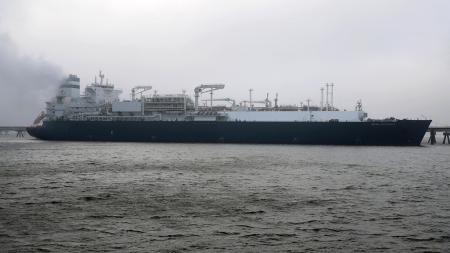Germany and its industry are going through the boreal winter without shocks or fears of gas rationing, after the cut off supply from Russiacountry of which it was dependent.
The winter, warmer than usual, allowed wholesale gas prices to fall throughout Europe to levels not seen since the start of the war.
“Energy prices are significantly lower for us. Our machines are working and all our employees are working again,” he celebrated. Christopher Profitlich, spokesman for the chemical company SKW Piesteritz in dialogue with the Bloomberg agency.
For Wolfgang Große Entrup, director of the German chemical industry chamber (VCI), “the risk of forced gas rationing seems to be gone this winter”
Meanwhile, according to Marius Baader, director of the aluminum chamber“the feeling of apocalypse is gone but there is still no reason to celebrate”.
But in addition to the climate that lowered prices, Germany seeks to reduce its strong dependence on Russia, a country from which it imported more than half (55%) of the gas it consumed before this country’s conflict with Ukraine.
For this, the construction of Liquefied Natural Gas (LNG) terminals was key to be able to import the fuel from alternative destinations such as Qatar, Norway or the United States.
Construction of LNG terminals
In record time Germany managed to plan, approve and build two LNG terminals in months to replace what it received from Russia through the Nord Stream gas pipeline, a supply that was completely cut off last September.
One of the terminals located in the port of Wilhelmshaven on the North Seawas inaugurated last month, and another one began to work this Saturday in Lubmin, on the Baltic Seathe only one to date whose cost of US$ 108 million was financed entirely with private funds.
“We are getting through this winter, everyone is feeling it at home, the gas supply is not affected,” declared German Chancellor Olaf Scholz, attending its inauguration.
But the supply substitution strategy does not end with these two plants: they will soon start operating another terminal in Brunsbüttel, at the mouth of the Elbe river in the North Seaas reported by the DPA agency.
The floating terminals already deployed or planned have a supply capacity of about 5,000 million cubic meters of natural gas per year, a figure that, in any case, is far from the 60,000 million cubic meters that entered Germany from Russia in 2021. via Nord Stream 1.
Germany’s goal is to cover about a third of its current gas demand through LNG shipments by next winter.
The terminals will not only allow Germany to cut its dependency on Russia, but it will also be able to stop using the ports of Belgium, France and the Netherlands to receive LNG, a process that entails higher transportation costs.
The unknown remains from whom Germany will provide itself: the country already signed a contract with Qatar Energy to supply the Wilhelmshaven terminal with two million tons of LNGbut deliveries are not scheduled until 2026.
A obstacle is that suppliers prefer long-term contractssomething that Germany does not want as it aspires to achieve carbon neutrality by 2045.
For now, with the weather and the new infrastructure playing in their favor, the shortage scenario for these months seems very unlikely: gas storage facilities are more than 90% full.
Added to this is the reduction in consumption carried out by both households and industry, the extension of the operating period of the last three nuclear power plants that the country has, and the temporary reactivation of oil and coal generating plants.
The stability in the energy situation it allowed Germany, like other European countries, to slide into stagnation in their economies in recent months instead of a recession that seemed assured.








